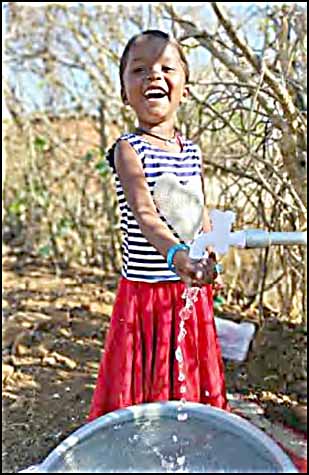Good Governance Day-Empowering Lives, One Drop at a Time

New Delhi, A little girl named Muskaan clapped her hands in joy as clean water gushed from the new tap in her home. It was a moment of celebration in Damhedi village, where the introduction of tap water transformed lives in ways the residents had never imagined. Her mother, overwhelmed with emotion, performed a small ritual to mark the occasion, knowing this tap signified more than just convenience. It was a source of dignity, health, and a promise of a brighter future. For Muskaan, it meant she could play without worrying about pestering her mother for water. For her mother, it meant time saved and fewer worries about her children’s health. This simple act of water flowing into a home symbolizes how good governance can uplift lives.
This transformation mirrors the spirit of Good Governance Day, observed on December 25 each year in honour of former Prime Minister Shri Atal Bihari Vajpayee’s birth anniversary. The day reminds us that governance is not just about administration, but about making life better for every citizen. Shri Vajpayee’s leadership exemplified the principles of good governance, which focused on accountability, transparency, and inclusive growth.
In alignment with this vision, the government celebrates Good Governance Week (Sushasan Saptah) every year from December 19 to 25, reinforcing its commitment to transparent, effective, and accountable governance. The week-long celebrations aim to spread the concept of good governance from districts to villages, ensuring that governance is transparent, effective, and accountable. Through various activities, the government demonstrates its commitment to providing governance that truly uplifts the lives of the people it serves.
Governance, at its core, is about decision-making and ensuring those decisions are implemented in a way that benefits society. The concept of good governance, however, goes deeper, focusing on participation, equity, and sustainability. According to the United Nations, good governance has eight major characteristics: it is participatory, consensus-oriented, accountable, transparent, responsive, effective, equitable, and inclusive, all while adhering to the rule of law. This comprehensive framework ensures that the voices of the most vulnerable are heard and that decisions are made to address both current and future needs.
The idea of good governance is deeply embedded in Indian tradition. In ancient India, kings were bound by Rajadharma, the ethical and moral principles of governance. Epics like the Mahabharata and Ramayana elaborate on the qualities of an ideal ruler, emphasising justice, fairness, and the welfare of the people. These age-old principles resonate even today, reminding us that governance must always aim to serve with integrity and compassion. The Jal Jeevan Mission is a modern manifestation of these timeless values, demonstrating how governance, when aligned with social justice, can bring tangible benefits to the weakest sections of society.
In 2019, when the Jal Jeevan Mission was announced by Prime Minister Narendra Modi, the situation was dire. Only 17% of rural households had tap water connections, leaving over 15 crore families dependent on external sources for water. This was more than an inconvenience; it was a daily struggle, especially in water-stressed regions. The mission has provided over 12 crore tap water connections under the scheme, significantly contributing to a total of 15.38 crore households with tap water connections across the country as of December 23, 2024. By ensuring that no household was left behind, the initiative became a beacon of hope for millions.
Transparency and responsiveness have been integral to the Jal Jeevan Mission’s success. Real-time data on the progress of tap water connections is publicly available, creating an environment of trust and ensuring that resources are used effectively. Community meetings offer platforms to address grievances and monitor the work’s quality. This adherence to the principles of transparency and accountability is a hallmark of good governance, which assures citizens that their voices are heard and their needs are met.
The impact of the Jal Jeevan Mission extends beyond the immediate convenience of tap water. For women, it means freedom from hours spent fetching water, allowing them time for education, livelihood activities, or rest. For children, it ensures better health by reducing waterborne diseases and allows them to focus on education and play. These improvements signify how good governance addresses interconnected aspects of human life, uplifting entire communities rather than delivering isolated solutions.
The principle of equity and inclusiveness lies at the heart of the mission. In tribal areas and marginalised communities, where access to clean water was once a distant dream, the Jal Jeevan Mission has become a symbol of empowerment. By prioritising a fundamental issue like access to clean water, the government has reaffirmed its commitment to governance as a tool for empowerment and equity. This initiative exemplifies how leadership rooted in good governance principles can inspire transformative change.
Government’s efforts to improve lives are not limited to the Jal Jeevan Mission. Schemes like the Pradhan Mantri Awas Yojana (PMAY), Pradhan Mantri Kisan Samman Nidhi, Pradhan Mantri Mudra Yojana (PMMY), and Ayushman Bharat, among others, reflect a comprehensive approach to addressing varied needs of the population. From ensuring affordable housing and financial assistance to providing health coverage and promoting entrepreneurship, these initiatives showcase how good governance creates pathways for inclusive development.
As Muskaan’s laughter fills her home, it serves as a powerful reminder of what good governance can achieve. It is not about ticking boxes or fulfilling minimum obligations but about making life better for every citizen. On this Good Governance Day, the Jal Jeevan Mission stands as a shining example of governance that listens, responds, and uplifts. It is a story of hope, progress, and a promise of dignity for all, resonating with the timeless ideals of Rajadharma and the vision of inclusive development.




